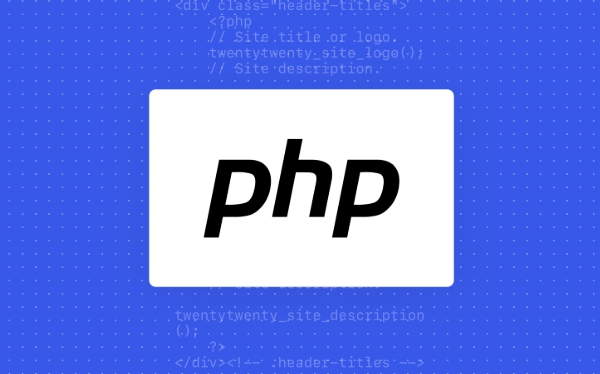Why is my PHP redirect not working
Jul 11, 2025 am 02:02 AMPHP redirection does not work usually result from the following reasons: 1. The header has been sent, such as spaces, HTML or include file output; 2. The header() is used incorrectly, such as syntax problems or lack of exit; 3. The logic is not triggered, such as conditional judgment errors; 4. Cache or server behavior interference. Solutions include avoiding early output, using header() correctly and adding exit, checking logical flow, clearing cache, or using tools to detect responses.

If your PHP redirect isn't working, you're probably running into one of a few common issues. The most likely culprits are headers already being sent, incorrect syntax, or output before the header() call. Let's go over some specific scenarios and what to check.

1. Headers Already Sent
One of the most frequent problems with redirects in PHP is that something has already been output before the header() function runs — even a single space or newline will break it.
- This includes:
- Extra spaces before
<?phpor after?> - Echo statements or HTML before the header
- Included files that have trailing spaces or output
- Extra spaces before
What to do:

- Make sure there's no output before
header('Location: ...') - Avoid closing
?>at the end of PHP-only files - Use output buffering if needed (
ob_start()at the top)
You'll often see an error like this:
Warning: Cannot modify header information - headers already sent by...
2. Incorrect Usage of header()
Even if you're using the right function, small mistakes can cause it not to work as expected.

Common issues include:
- Missing quotes or parentseses in the
header()call - Using relative URLs without proper context
- Forgetting to exit after sending the header
Example of correct usage:
header("Location: https://example.com");
exit;Tips:
- Always use quotes around the string (single or double)
- Use full URLs when possible to avoid confusion
- Add
exitordie()after the redirect to stop further execution
3. Redirect Logic Not Triggering
Sometimes the code is fine, but the redirect never gets reached because of how the logic flows.
This usually happens when:
- The redirect is inside a conditional block that doesn't evaluate to true
- There's a typo in the condition or path
- You're testing locally and forgot the redirect was only for certain cases
What to do:
- Double-check your conditions (
if,switch, etc.) - Add temporary debugging output like
echo "Redirect should happen";before the header - Make sure the script reaches the
header()line by checking logs or adding breakpoints
4. Caching or Browser Behavior
In some cases, the redirect works, but it seems like it doesn't due to browser caching or server-level redirects interfering.
Things to try:
- Clear your browser cache or test in incognito mode
- Use tools like Postman or curl to inspect actual HTTP responses
- Check
.htaccessor web server config for conflicting rules
So, start by checking for early output, then confirm your syntax and logic flow. If everything looks good but still not working, look into caching or server-level settings. Basically that's it.
The above is the detailed content of Why is my PHP redirect not working. For more information, please follow other related articles on the PHP Chinese website!

Hot AI Tools

Undress AI Tool
Undress images for free

Undresser.AI Undress
AI-powered app for creating realistic nude photos

AI Clothes Remover
Online AI tool for removing clothes from photos.

Clothoff.io
AI clothes remover

Video Face Swap
Swap faces in any video effortlessly with our completely free AI face swap tool!

Hot Article

Hot Tools

Notepad++7.3.1
Easy-to-use and free code editor

SublimeText3 Chinese version
Chinese version, very easy to use

Zend Studio 13.0.1
Powerful PHP integrated development environment

Dreamweaver CS6
Visual web development tools

SublimeText3 Mac version
God-level code editing software (SublimeText3)
 PHP Variable Scope Explained
Jul 17, 2025 am 04:16 AM
PHP Variable Scope Explained
Jul 17, 2025 am 04:16 AM
Common problems and solutions for PHP variable scope include: 1. The global variable cannot be accessed within the function, and it needs to be passed in using the global keyword or parameter; 2. The static variable is declared with static, and it is only initialized once and the value is maintained between multiple calls; 3. Hyperglobal variables such as $_GET and $_POST can be used directly in any scope, but you need to pay attention to safe filtering; 4. Anonymous functions need to introduce parent scope variables through the use keyword, and when modifying external variables, you need to pass a reference. Mastering these rules can help avoid errors and improve code stability.
 How to handle File Uploads securely in PHP?
Jul 08, 2025 am 02:37 AM
How to handle File Uploads securely in PHP?
Jul 08, 2025 am 02:37 AM
To safely handle PHP file uploads, you need to verify the source and type, control the file name and path, set server restrictions, and process media files twice. 1. Verify the upload source to prevent CSRF through token and detect the real MIME type through finfo_file using whitelist control; 2. Rename the file to a random string and determine the extension to store it in a non-Web directory according to the detection type; 3. PHP configuration limits the upload size and temporary directory Nginx/Apache prohibits access to the upload directory; 4. The GD library resaves the pictures to clear potential malicious data.
 Commenting Out Code in PHP
Jul 18, 2025 am 04:57 AM
Commenting Out Code in PHP
Jul 18, 2025 am 04:57 AM
There are three common methods for PHP comment code: 1. Use // or # to block one line of code, and it is recommended to use //; 2. Use /.../ to wrap code blocks with multiple lines, which cannot be nested but can be crossed; 3. Combination skills comments such as using /if(){}/ to control logic blocks, or to improve efficiency with editor shortcut keys, you should pay attention to closing symbols and avoid nesting when using them.
 How Do Generators Work in PHP?
Jul 11, 2025 am 03:12 AM
How Do Generators Work in PHP?
Jul 11, 2025 am 03:12 AM
AgeneratorinPHPisamemory-efficientwaytoiterateoverlargedatasetsbyyieldingvaluesoneatatimeinsteadofreturningthemallatonce.1.Generatorsusetheyieldkeywordtoproducevaluesondemand,reducingmemoryusage.2.Theyareusefulforhandlingbigloops,readinglargefiles,or
 Tips for Writing PHP Comments
Jul 18, 2025 am 04:51 AM
Tips for Writing PHP Comments
Jul 18, 2025 am 04:51 AM
The key to writing PHP comments is to clarify the purpose and specifications. Comments should explain "why" rather than "what was done", avoiding redundancy or too simplicity. 1. Use a unified format, such as docblock (/*/) for class and method descriptions to improve readability and tool compatibility; 2. Emphasize the reasons behind the logic, such as why JS jumps need to be output manually; 3. Add an overview description before complex code, describe the process in steps, and help understand the overall idea; 4. Use TODO and FIXME rationally to mark to-do items and problems to facilitate subsequent tracking and collaboration. Good annotations can reduce communication costs and improve code maintenance efficiency.
 Quick PHP Installation Tutorial
Jul 18, 2025 am 04:52 AM
Quick PHP Installation Tutorial
Jul 18, 2025 am 04:52 AM
ToinstallPHPquickly,useXAMPPonWindowsorHomebrewonmacOS.1.OnWindows,downloadandinstallXAMPP,selectcomponents,startApache,andplacefilesinhtdocs.2.Alternatively,manuallyinstallPHPfromphp.netandsetupaserverlikeApache.3.OnmacOS,installHomebrew,thenrun'bre
 How to access a character in a string by index in PHP
Jul 12, 2025 am 03:15 AM
How to access a character in a string by index in PHP
Jul 12, 2025 am 03:15 AM
In PHP, you can use square brackets or curly braces to obtain string specific index characters, but square brackets are recommended; the index starts from 0, and the access outside the range returns a null value and cannot be assigned a value; mb_substr is required to handle multi-byte characters. For example: $str="hello";echo$str[0]; output h; and Chinese characters such as mb_substr($str,1,1) need to obtain the correct result; in actual applications, the length of the string should be checked before looping, dynamic strings need to be verified for validity, and multilingual projects recommend using multi-byte security functions uniformly.
 Learning PHP: A Beginner's Guide
Jul 18, 2025 am 04:54 AM
Learning PHP: A Beginner's Guide
Jul 18, 2025 am 04:54 AM
TolearnPHPeffectively,startbysettingupalocalserverenvironmentusingtoolslikeXAMPPandacodeeditorlikeVSCode.1)InstallXAMPPforApache,MySQL,andPHP.2)Useacodeeditorforsyntaxsupport.3)TestyoursetupwithasimplePHPfile.Next,learnPHPbasicsincludingvariables,ech






